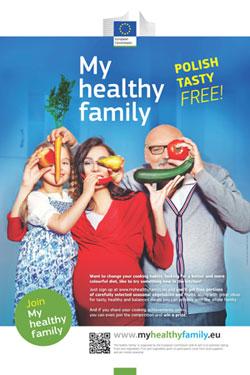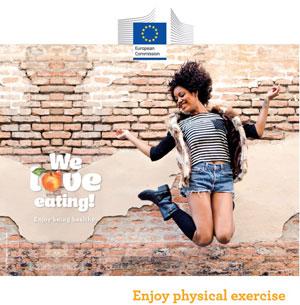Pilot projects are designed to test the feasibility and usefulness of specific activities. They are used to try out different approaches, develop evidence-based strategies, identify good practices, and provide policy guidance for the benefit of possible future initiatives in the area of nutrition and physical activity.
Feel free to browse the ongoing or recently concluded projects below.
My healthy family

My healthy family was an EU project tested in Hungary and Poland in 2015 which aimed to encourage vulnerable population groups to eat more fruit and vegetables. This was done by distributing free fruit and vegetables and, getting well-known chefs to share recipes, nutritional information and to provide cooking lessons.
More than 23,500 people (7,000 households) from four regions took part, Észak-Alföld and Észak-Magyarország in Hungary, and Kujawsko-Pomorskie and Podkarpackie in Poland. Particular attention was paid to reaching out to children, older people and pregnant women.
Related information
- Contractor's guide, also in Polish and Hungarian
- Literature review
- Zero measurement - Key results
- Project evaluation
- Project recipes - Project ambassadors Magda Gessler and Alexandra Béres, also available in Hungarian and Polish
- Teaching resources, also available in Hungarian and Polish
- Dissemination workshop and presentations.
We love eating

This project aimed to promote a healthy lifestyle in seven EU cities using games, recipes, leaflets, posters to encourage children, pregnant women and older people to eat more fruit and vegetables, drink more water and take up physical exercise.
2,158 individuals in Granollers, Ronques, Bradford, Deventer, Poznan, Banska Bystrica and Cluj Napoca provided feedback attesting to an overall increased awareness of the benefits of a healthy diet, and physical activity.
Related information
- Guide to creating a local healthy diets project
- Zero measurement – Key results
- Initial launch report
- Monitoring survey – Key results
- Monitoring report
- Project evaluation
- Dissemination workshop and presentations.
Together
This project promoted healthier diets and regular physical activity before, during and after pregnancy. It targeted mothers and expectant mothers from disadvantaged groups in particular, reaching out to close to 1million pregnant or breastfeeding women in:
- Prague (Czechia)
- Manchester (United Kingdom)
- Murcia (Spain)
- Varna (Bulgaria)
- Odense and Kolding (Denmark).
Related information
- Project Guide
- Zero measurement survey
- Launch information
- Key results
- Literature review and best practices
- Closing events information
- Official Project website
- Facebook page
- Study on good practice on communicating on health determinants to prevent chronic diseases
- Dissemination workshop and presentations.
Taste booster
In 2012, the European Commission launched the ‘Taste Booster’ pilot project testing ways to best encourage pregnant women, children and older people to eat more fresh fruit and vegetables in regions with primary household income below 50% of the EU average.
The project was carried out through a series of cooking lessons in schools, community centres, hospital maternity wards in Kosice and Poprad (Slovakia), Roman and Medigidia (Romania) and Lovech and Troyan (Bulgaria).
Participants prepared recipes containing fresh fruit and vegetables under the guidance of chefs and nutritionists. At the end of each session they were provided with a kit containing ingredients and recipes, allowing them to recreate the experience at home.
Between 2012 and 2014 an estimated 5,000 individuals participated in 1,000 cooking sessions and events, and up to 98 tonnes of fruit and vegetables were consumed and distributed.
Related information
- Project guide
- Poster
- Leaflet
- Recipes
- Presentation on methodology and conclusions
SciView

This EU-funded preparatory action reviewed scientific evidence and policies to create a comprehensive evidence-base for more effective and efficient action to tackle challenges related to nutrition and physical activity, and to help prevent non-communicable diseases among vulnerable people and disadvantaged groups in particular. The two-year project began in February 2016 and ended in February 2018.
The project aimed to reach the above aims by:
- Comprehensive literature reviews of published scientific literature
- Interviews with experts to obtain feedback and input to policy recommendations
- Development of case studies, highlighting initiatives at EU, national or local level
- Expert workshops to discuss and validate the results of the literature reviews
Project deliverables:
For each one of the following 8 areas the project delivered a review and summary report:
- Knowledge, attitudes and behaviours contributing to positive energy balance (review and summary)
- Dietary and physical activity patterns in Europe (review and summary)
- Consumption of fruit juices, artificially and sugar-sweetened beverages and its impact on weight status and health (review and summary)
- Consumption of high-fructose syrup and its impact on weight status and health (review and summary)
- Relationship between weight status and physical activity with school and work performance outcomes (review and summary)
- Early warning indicators of obesity and physical inactivity trends (review and summary)
- Nutrition and physical activity guidelines for specific population groups (review and summary)
- Effectiveness and efficiency of health policies and interventions in nutrition and physical activity (review and summary)
Related information
